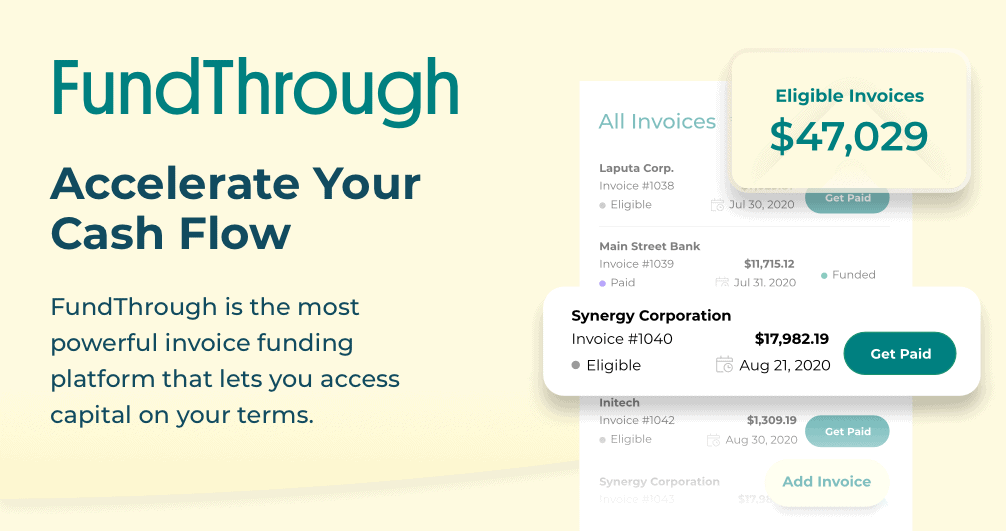Startups are often too reliant on raising capital through rounds of external funding. So why do 82% of small businesses fail because of cash flow problems? Consistent cash flow can prove crucial to the survival of small and medium-sized businesses (SMBs).
One way that SMBs can access to the cash they need comes in the form of short-term loans (vs. a long-term loan). Short-term business loans can be a fast and effective way for a business to get the money it needs to stay afloat. But when should a company take out a short-term business loan? What does it take to qualify? What can they expect from short-term business loans for startups?
Why do I need a short-term business loan?
Just like the name implies, a short-term loan is one of the fastest and most popular ways for small businesses to find the money they need. The simple definition is that they are exactly what they sound like—loans that are uniquely designed to be dispersed quickly and paid back just as fast.
Unlike lines of credit, short-term loans are intended to be repaid in one year, although they’re often repaid even faster. However, there’s more to a short-term business loan than meets the eye. Although access to capital can make a short-term loan look like an attractive option, everything isn’t so simple.
What is a short-term business loan and how does it work?
Just like the name implies, a short-term loan is one of the fastest, and most popular, ways for small businesses to find the money they need with a short turnaround. But how do you define a short-term loan? The simple definition is that they’re exactly what they sound like. They’re loans uniquely designed to be dispersed quickly and paid back just as fast.
A short-term loan is intended to be repaid in one year, although they’re often repaid even faster. However, there’s more to a short-term business loan than meets the eye. Although fast access to capital can make a short-term loan look like an attractive option, everything isn’t so simple.
Types of short-term business loans
Short-term loans come in a variety of sizes and shapes. (You can also look into other types of small business loans for startups here.)
Term Loans: If you want to expand and have good credit, you can consider a term loan. You get cash upfront, and you may be able to borrow more than with shorter-term financing. However, you may have to offer up collateral, and loan terms are often not as reasonable as with other options.
Line-of-Credit: Many businesses we work with don’t qualify for lines of credit, as they come with strict requirements. It also takes months to get approved. However, if you qualify, a line-of-credit is a useful option to have in your financial toolbox. You get a line of credit – much like a credit card – that you draw on and pay back up to your credit limit. It’s flexible financing and usually unsecured by collateral.
Equipment Loans: These types of loans help you buy much-needed equipment to run your business. Most of these loans offer a scheduled monthly payment and competitive interest rates if you have good credit.
Merchant Cash Advance: If you’re a B2B business that can’t accept credit cards (or has buyers that don’t pay this way) this won’t apply. But if that’s not the case for you, this is one upfront lump of cash to finance your business or fund a business emergency. Interest rates, however, can be very high, and because of the frequent payment options, you can have cash flow issues.
Personal Loan: If you have no operating history, you may not qualify for a short-term business loan. But you may qualify for a personal loan to be used for your business. Rates and terms can be unfavorable, but it may be one of your only options if you’re a startup.
You may also consider a business credit card as well as invoice factoring or financing for startups — all viable options to taking out a loan.
A short-term solution with a steep price
First, short-term loans tend to be more expensive than traditional loans. If you want your money fast, you’re going to have to pay for it. That means you’ll find yourself dealing with higher interest rates that can ultimately hurt your business. Short-term loans for businesses with bad credit can be even more expensive.
If you’re confident that you can keep up with a more aggressive payment schedule, and it’s something you only see your business doing once or twice, a short-term loan could be a good option for you. Just be careful to make sure your business doesn’t find itself in a debt trap. What starts off as a blessing can quickly turn into a financial curse if left unchecked.
How do I qualify on a short-term business loan?
One of the biggest hurdles for small businesses across the country is qualifying for a loan. Like most loans, there’s a qualification process involved in being approved. This frequently involves providing a record of your company’s cash flow and payment history for the past few years. You’ll also usually need to summarize your personal finances and go through a credit check.
Still, even with these hoops to jump through, qualifying for a short-term loan can be much easier than for a long-term bank loan. Bank loans can be notoriously difficult to come by, with more than 80 percent of applicants turned away. This can make short-term loans a much more realistic option for SMBs in their early stages.
Can I get a short-term loan for my startup business?
Short-term business loans subscribe to a different set of standards when compared to traditional bank loans. A key difference is that it can be much easier for startups to qualify for them. That said, it’s important to remember that although businesses might not have to supply the same level of financial history, there’s a chance of having to put up additional collateral to offset the risk.
What kind of collateral do I need for a short-term business loan?
When you’re applying for this type of loan, you’re dealing with a different set of standards when it comes to qualification. These more relaxed standards also mean that there’s a higher likelihood that your startup will need to provide some sort of collateral. What can be accepted as collateral runs the gamut of available assets. This could range from property to real estate to accounts receivable.
Accounts receivable are one form of collateral that is particularly notable. This is money that your business is already owed, so you can get a loan based on the knowledge that you have incoming capital on the books. The ability to take advantage of invoices you’re waiting on to be paid is a driving force of what makes invoice financing work so well for B2B businesses looking to bridge a cash flow gap between invoice payments.
Is a short-term loan right for my business?
If you need to purchase inventory for a new order or materials for a new product, and you’re still waiting to be paid on the last item you delivered, you may need an influx of cash for a short time only. Short-term loans offer just that. It’s not the only option — check out invoice factoring or invoice financing — but a short-term loan as a short-term financing option can get you over the hump.
While they can provide money quickly, interest rates are often higher and amounts vary — generally, from about $5,000 to $250,000, and they carry shorter repayment terms than other loans, from several months to several years.
If you have cash flow gaps or another unseen expense you never planned for, a short-term loan may give you the cash you need. There are also times in the life cycle of your company when you have the opportunity to take on a large project that will grow your business and this type of loan from an online lender, bank, or credit union can help.
What are the most common reasons for a short-term loan?
There are dozens of reasons why businesses, especially startups and smaller businesses, need an advance or some other type of short-term financing. A few of the most common reasons, include:
- Buy inventory, raw materials or equipment. Whether a service-oriented business with three employees who each need a desk and computer, to a small manufacturer with orders to fill, a quick influx of cash helps meet these needs.
- Grow your company. Maybe your company just landed a big job and to fulfill the contract you need more equipment and space. Or you’re hiring additional employees and just need a little extra capital to keep the momentum going.
- To market or advertise your business. The costs associated with getting the word out about your business can add up. Quick funding can help if you’re getting a positive ROI.
- Bring in additional cash. One of the most common reasons small business turn to short-term loans is cash flow issues. You have unsold inventory or unpaid invoices but still must make payroll, pay your rent or mortgage, utilities, and more. One way to overcome these issues is a short-term loan. Invoice funding is perfect for these situations.
- Building credit. Qualifying for a shorter-term loan today may help you get a long-term loan tomorrow. If you’re a startup with little credit history or a small credit limit, you may need to look for a longer-term business financing option down the road. A long-term commitment usually also requires a minimum credit score, bank statements, a financial statement, and possibly a personal guarantee. Many banks and credit unions also have annual revenue requirements. However, qualifying for invoice funding is more dependent on the credit of your customers – not your own.
How to apply for a short-term business loan
1. Improve or build both your personal and business credit score. If you have low or no credit, you might need to find ways to build it up, through a business credit card or other financing. Many online lenders, however, will provide loans if you have less-than-stellar credit, but you’ll end up paying high interest with shorter terms. You will likely also not qualify for as much money, and may have to pay upfront costs or a prepayment penalty. Building good credit can take time, but it’s well worth the effort on your part.
2. Find out what your lender’s minimum requirements and qualifications are for short-term financing. Just like a personal loan, traditional lenders have minimum requirements for a business shorter-term loan. Most often you’ll need to meet minimum credit score requirements, submit your annual revenue and show how many years you’ve been in business. Type of business—like a seasonal business—may also be a criteria to qualify in some instances. Some lenders are flexible, however, so if you don’t meet their qualifications in one area, but overperform in another area, they may still provide a loan offer.
3. Gather all of your legal and financial documents. Traditional business loans require both legal and financial documents for short-term business financing that may include:
- Business licenses
- Commercial leases
- Personal and business income tax returns
- If applicable, articles of incorporation
- Income statement and balance sheet
- A photo of your driver’s license
- Business and personal bank statements
- Your resume showing relevant business experience
- Financial goals and projections if your a start-up
Lenders often offer an online application that is streamlined and requires fewer documents. This is especially true of online lenders.
Invoice financing transforms receivables into working capital
Invoice financing is a popular lending alternative to loans for business, especially for startup businesses looking to improve their cash flow quickly.
Online invoice financing has made the process of improving cash flow and generating capital faster and easier than ever, with startups able to find the cash flow they need in as little as 24 hours. It’s possible to receive up to 100 percent of the value of your invoice (less a fee). Innovative online platforms—like FundThrough—mean that there’s no unnecessary paperwork to hold up the process of getting you your money.
Transparent fees beat high interest rates every time
One aspect of invoice financing that makes it stand out from other types of short-term business loans is the way fees are handled. While other short-term loans for startup businesses can carry high-interest rates, costs for invoice financing are designed to be transparent, so startups know what they’re signing up for. This is often a fee that is calculated up-front, so small businesses have all the knowledge they need to make an informed decision.
For startups looking for a straightforward path to a short-term business loan, invoice financing is a valuable and affordable way to get working capital now. As small business loans become increasingly tough to find, making sure you get paid the money you’ve already earned just makes sense.
Suggested Readings

The 10 Best Banks for Small Businesses in 2025
READ

Same-Day Business Funding: 3 Best Options & Tips for Success
READ

Strong Canadian Support is Critical for Small Businesses to Survive—And Even Thrive—Amid Trump’s Tariff Chaos
READ

7 Best No Credit Check Business Funding Options: Success Tips for SMBs
READ

FundThrough Named Best Overall Invoice Factoring Company by Top Business and Finance Outlets
READ

Lima Charlie: Raising $8M in 30 Days to Unlock New Growth Channel
READ
